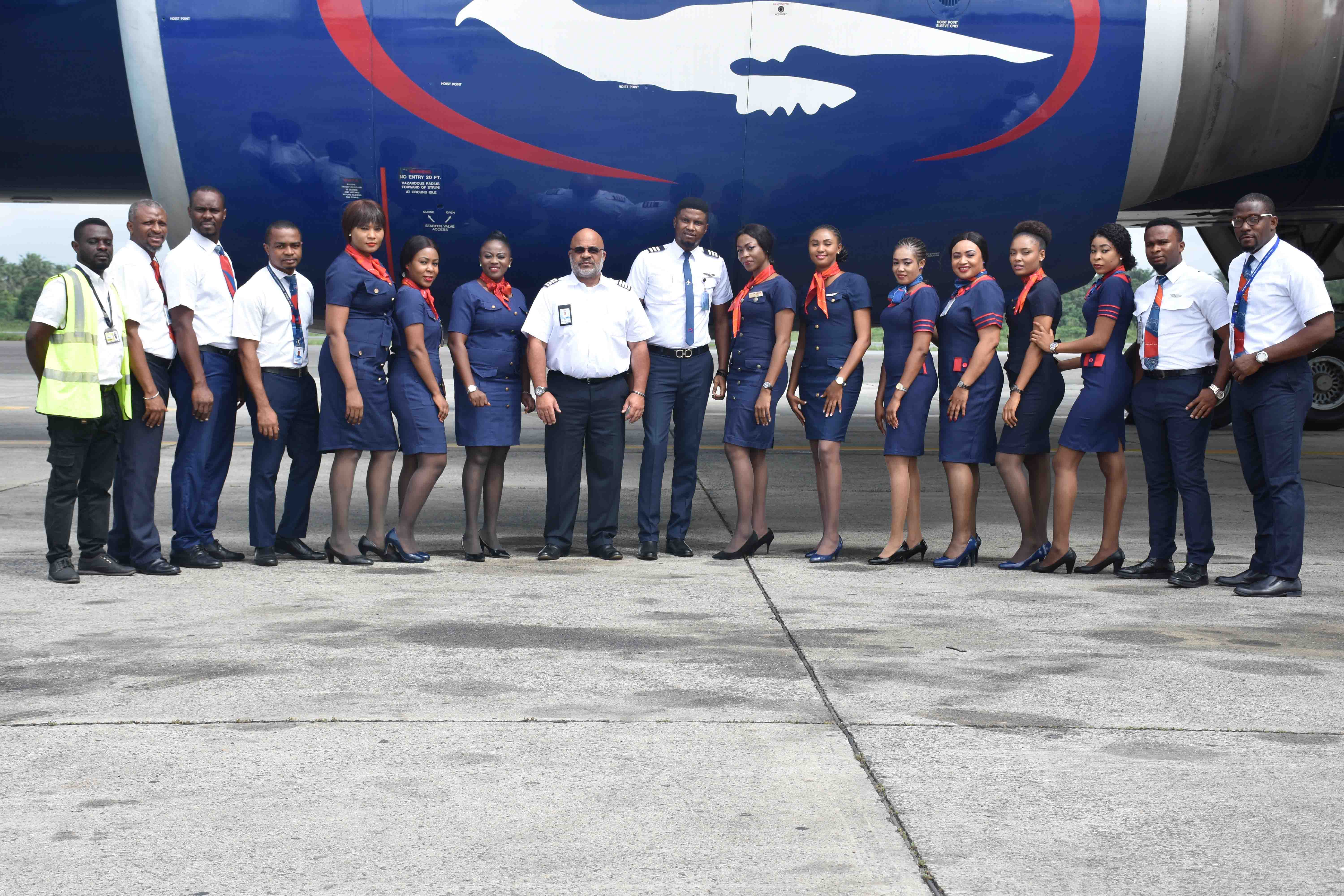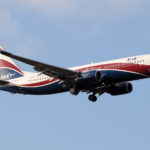
As Air Peace last week celebrated five years, many industry stakeholders have expressed hope that the airline, which has warmed itself in the hearts of the people, would exist and operate profitably for many, many years.
Those who spoke to THISDAY were even surprised that the airline was established just five years ago because of its accomplishments in these few years. Some said they thought Air Peace has been there since the past 10 years.
This is an airline that started with seven aircraft but within this short period it has acquired 30 airplanes, operate to over 22 domestic airports and has started international operation with flights to Dubai via Sharja since July 5, 2019.
Air Peace warmed itself into the heart of Nigerians when it evacuated 500 Nigerians from South Africa during xenophobia attacks and also with the Lagos-Dubai operation, Air Peace is poised to expand its international service to London, India, Beijing, Johannesburg, and New York.
Breaking the Jinx
Nigerian airlines are faced with the challenge of survival. The Managing Director/Chief Executive Officer, Asset Management Corporation of Nigeria (AMCON), Mr. Ahmed Lawan Kuru told Senators when he appeared before the Senate Committee on Banking, Insurance and other Financial Institutions last Monday that Nigerian airlines do not last more than average of 10 years.
“There is something the National Assembly should do to help the aviation industry. Why is it that there is no airline in Nigeria that has successfully existed for 10 years? We have successful businessmen in Nigeria, which tell you that what is happening in the aviation sector is a structural problem that needs to be address and I think the National Assembly has a role to play there.
“The current state of the sector is not helping the operators; for instance, the fees and charges they pay to different agencies are too high. There are quite a lot of issues that I think when we sit down to address, we should be able to help the industry because it is very strategic to the development of the economy of Nigeria,” Kuru said.
Kuru, however, accused airlines of lack of corporate governance as one of the factors that contribute to their collapse. But using Arik Air, for example, which blazed the trail with the acquisition of new aircraft fleet after 20 years of hibernation when no airline ordered and acquired a new aircraft in Nigeria, some industry observers then asked, if Arik Air was able to meet the stringent conditions of international financiers that extended credit facilities to it to acquire the news aircraft, how was it able to do that without corporate governance?
An industry stakeholder who wrote recently on the issue noted that, “the painstaking efforts and doggedness of the private sector promoters should be commended because they managed to grow in the face of muscling government policies, international competition and harsh local environment, bereft of infrastructure that can support adequate aircraft utilisation.”
He also remarked that it was the responsibility of the Nigerian Civil Aviation Authority (NCAA), as economic regulator and the Ministry of Aviation to ensure that every airline abide by the rules.
Protecting Nigerian Carriers
By August this year foreign airlines had sold tickets worth about $700 million in Nigeria and they anticipated that by December they would have sold $1 billion tickets. Over 80 per cent of this sum is repatriated. For Nigeria to benefit from this huge amount, Nigerian airlines should be empowered by government to provide international services like their foreign counterparts.
It is not only the fact that foreign airlines dominate international destinations, they also charge outrageous fares from Nigeria.
This was confirmed by the CEO of Aero Contractors, Captain Ado Sanusi, who told THISDAY that it costs more to travel from Lagos to Frankfurt with Lufthansa that it cost from Frankfurt to Orlando, but while Lagos-Frankfurt flight is six hours, Frankfurt-Orlando flight is about 11 hours.
Director of Engineering, Ibom Air, Lukeman Animaseun recently told THISDAY that to check outrageous fares charged Nigerian travellers by foreign airlines and also to help domestic airlines operate profitably, government need to support its own airlines.
These supports could be in the area of stable aviation fuel supply at relatively lower prices, access to single digit interest, long-term loans, a review of the multi-designation of foreign airlines to various airports in the country and standing behind Nigerian carriers when they apply to operate to other countries.
Multiple Taxes and Charges
Industry stakeholders noted that in many countries of the world, domestic airlines enjoy certain levels of tax holidays, even when the airlines are fully privately owned. This is to encourage them because they serve as catalyst to economic development of any nation. But in Nigeria sundry charges and levies at airports nationwide, account for at least 65 per cent of airlines’ earnings. Besides the five per cent charge on every ticket bought by passengers, which goes to NCAA and other agencies, domestic airlines are also meant to other charges.
These include the five per cent Cargo Sales Charge, five per cent Value Added Tax (VAT, which government was supposed to have withdrawn), Passenger Service Charge of N1000 per ticket on local route, Charter Sales Charge, Aircraft Inspection Fees, Simulator Inspection Fees, Landing Charges, Parking Charges and Terminal Navigational Charge.
Others are Enroute Charge, Fuel Surcharge, Airport Space Rent, Electricity charges, Apron Pass, ODC (on duty card) registration fee, Service Recovery Charge, Processing Fee, Avio Bridge, Aircraft Registration and Processing Fee.
The airlines also pay Toll Gate Fee, VIP Lounge, Trolley Service, Clearance Fee, Check-In Counter Charge, Courier/Tarmac/Pre-Release charges, Import Charge (domestic), Export Charge (domestic), Import Royalty, Export Royalty, Ports Charge, Exports Charge, Tran-shipment and Concession Fee.
Together, these charges eat deeply into the earnings of the airlines. Chief Executive Officer of Air Peace, Allen Onyema, recently said if the current regime of taxation were not reviewed downwards, no airline would survive.
Onyema, said though the charges had been in the system for long and some of them as fallouts of legislations, it was high time they were reviewed to ease the burden on commercial airlines.
“I suggest that government should raise a consulting firm to go round the country to find out why airlines have been dropping off. Heavy taxation is part of it. We are suffering.
“Air Peace supports payment of taxes to government; no government runs without the citizens paying tax. Airlines must pay their taxes. What we are asking is for these taxes to be streamlined in such a way that it will help us to help the government and help the country.
“Commercial airlines are a catalyst to economic development in any country. That is why every country supports its airlines. We are not asking for any financial assistance but for an enabling environment that makes things work. It is not complimentary for us as a country that all our airlines are dying,” Onyema said.

Government Policies
Industry operators allege that government through the relevant ministries and agencies deliberately hinder the growth of domestic airlines that actually create jobs. They said these agencies promote policies that tend to encourage foreign carriers that operate into the country.
They noted that despite the fact that government knows that domestic airlines will not grow if foreign airlines are encouraged to operate unhindered into the country, government has not taken any concrete step to show support to local carriers, like insisting that foreign airlines code-share with them if they want to operate to more one airports in the country.
Many industry observers also believe that government is really indifferent to the development of the aviation industry so they are more interested in getting foreign airlines to operate and airlift Nigerians to international destinations.
The President of Sabre Network, Africa and also the President of industry think-tank body, Aviation Round Table (ART), Dr Gbenga Olowo, told THISDAY that Nigeria needs the foreign airlines but efforts should be made by the country to balance the trade by empowering local carriers to compete with the international airlines.
He said it is easy for government to insist that international airlines must code-share with domestic airlines for designation into more airports in the country.
“I feel that we don’t have the will to change the trend. This is because to change it is very simple. Foreign airlines are here giving us service and we need the service. So why don’t we strengthen our own to make sure they compete and rescue that negative balance of trade?” he said.
Olowo, also said that it is easy to renegotiate Bilateral Air Service Agreements (BASA) to make them mutually beneficial to both the local and international carriers, adding that if there is the will, government can do that easily.
“It is very simple. It is just the Minister of Aviation getting ready to reverse the trend. Once you have strong Nigerian player, you call the other airlines to the table. You tell them, ‘You have enjoyed it for so long; I am strong now so it is going to be equal’. For example, you tell British people (BA and Virgin Atlantic Airways), you are doing 21 frequencies we also want to do 21.
“If we are going to over flog the market with 21 frequencies on each side, you reduce your own to 10. So when we have excess capacity, we grow together,” he added.
Also recently a communiqué issued by Aviation Round Table (ART) after its third quarter breakfast meeting this year, noted, “It was observed that granting multiple destinations to foreign carriers is not an economically wise decision. It is a deliberate annihilation of the domestic market. Our commercial agreements must be anchored on the principle of reciprocity,” the communiqué said.
Industry stakeholders have agreed that the Nigerian government is not interested in growing a robust aviation industry with viable domestic airlines.
They insisted that Nigeria does not have policies that encourage the airlines; rather, it has made Nigeria a feasting ground for foreign carriers that acknowledged that Nigeria is one of their major profitable routes.
So to break the jinx of average 10-year lifespan for Nigerian airlines, government must tinker with its current policies with the intention to create opportunities for domestic airlines to thrive.
THISDAY






